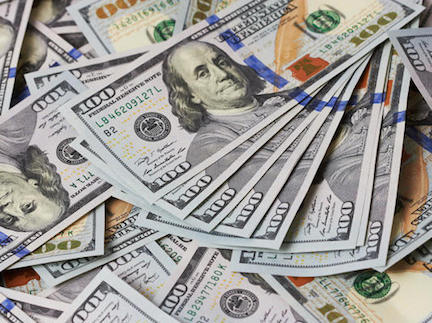Don’t expect much of a respite from U.S. officials’ squawking about the dollar, even as the currency is near a three-month low in the lead-up to this week’s pivotal Group-of-20 summit.
President Donald Trump believes the dollar is too strong, a senior administration official said Tuesday. Last week, Trump accused Europe and China of weakening their currencies to gain a competitive advantage. Wall Street banks are even starting to ponder the risk that the U.S. could seek to drive the dollar lower. And with Democratic presidential candidate Elizabeth Warren proposing “actively managing” the currency, its value promises to be a topic deep into the election cycle.

“Currencies really need to be a part of any trade deal, for the obvious reason that they are going to play a key role in any rebalancing of trade deficits between two economies,” Pandl said. “The more action we see on tariffs, the more important it’s likely going to become for the Trump administration to focus on the repercussion for currency markets.”
Officials already have some steps in mind. Last month, the administration proposed taxing goods from countries with undervalued currencies—a measure that was said to alarm officials at the Treasury Department. The U.S. has also sought a yuan stability pact as part of an eventual deal with China, according to people familiar with the matter.
Here are some of the pressure points leading up to the summit:
Costly Dollar
Currency valuations have emerged as a sticking point for Trump, who tweeted this month that the “devalued” euro is “putting the U.S. at a big disadvantage.” He doubled down on the criticism last week after European Central Bank President Mario Draghi said additional stimulus may be required.
For some currency watchers, Trump may have a point: A Federal Reserve index that weights the greenback against a broad basket of the largest U.S. trading partners is 2% below its 2002 record.
China’s yuan has also drawn Trump’s ire. After the U.S. raised tariffs on $200 billion of Chinese imports last month, the yuan weakened toward 7 per dollar—a level not seen since the financial crisis. The dollar-yuan rate has since stabilized near 6.88 ahead of a scheduled meeting between Trump and Chinese leader Xi Jinping.
Intervention Risk
The ramped-up rhetoric has some analysts considering the possibility that the Trump administration might take action. The U.S. hasn’t intervened in FX markets since 2011, when it stepped in as part of an international effort after the yen soared in the wake of that year’s devastating earthquake in Japan. Now, Bank of America Corp. sees a rising risk that the U.S. will sell dollars.
“There is a risk that the administration entertains currency intervention under the auspices of dollar stabilization,” BofA economist Michelle Meyer and FX strategists Ben Randol and Adarsh Sinha wrote in a note last week. “Sustained intervention is unprecedented in the modern era and may have significant consequences.”
G-20 finance ministers and central bankers this month reaffirmed a commitment to refrain from competitive devaluation. However, the U.S. could justify intervention as a way to counter market volatility, the BofA analysts wrote.
Policy ‘Wildcard’
JPMorgan Chase & Co. is also entertaining the idea. One “wildcard” for the second half of 2019 is that the White House becomes more active in currency policy, which could include stepping into markets, analysts including Daniel Hui wrote in a June 21 note.
“Whether this is just a passing focus aimed more at criticizing Fed policy, or a permanent new front in international economic policy remains to be seen,” they wrote. “Direct intervention to weaken the dollar might have significant bearish impact.”
And among those campaigning for the 2020 election, Trump isn’t alone in his attention to the dollar.
In a policy plan released this month, U.S. Senator Warren cited currency management by other countries and blamed foreign investors and central banks for having “driven up the value of our currency for their own benefit,” echoing language Trump has used to complain about other nations’ practices.











